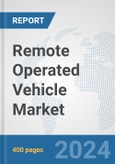The report on remote operated vehicle market is a comprehensive study and presentation of drivers, restraints, opportunities, demand factors, market size, forecasts, and trends in the global remote operated vehicle market over the period of 2021-2030. Moreover, the report is a collective presentation of primary and secondary research findings.
Porter's five forces model in the report provides insights into the competitive rivalry, supplier and buyer positions in the market and opportunities for the new entrants in the global remote operated vehicle market over the period of 2021-2030. Further, Growth Matrix gave in the report brings an insight into the investment areas that existing or new market players can consider.
Report Findings
1) Drivers
- The rise in the adoption of robots in law enforcement and the military and defense sectors drives the remote operative vehicle (ROV) market.
- The ROV market is influenced greatly by continuous research and development (R&D) in underwater technologies, such as cameras and sensors
2) Restraints
- High initial investment and operational costs may hamper the future growth of the market.
3) Opportunities
- Government funding and assistance, as well as the framework's basis in the form of subsidies or low-interest loans, may open up future opportunities for the worldwide remote operative vehicle (ROV) market.
Research Methodology
A) Primary Research
The primary research involves extensive interviews and analysis of the opinions provided by the primary respondents. The primary research starts with identifying and approaching the primary respondents, the primary respondents are approached include1. Key Opinion Leaders
2. Internal and External subject matter experts
3. Professionals and participants from the industry
The primary research respondents typically include
1. Executives working with leading companies in the market under review2. Product/brand/marketing managers
3. CXO level executives
4. Regional/zonal/country managers
5. Vice President level executives.
B) Secondary Research
Secondary research involves extensive exploring through the secondary sources of information available in both the public domain and paid sources. Each research study is based on over 500 hours of secondary research accompanied by primary research. The information obtained through the secondary sources is validated through the crosscheck on various data sources.The secondary sources of the data typically include
1. Company reports and publications2. Government/institutional publications
3. Trade and associations journals
4. Databases such as WTO, OECD, World Bank, and among others.
5. Websites and publications by research agencies
Segment Covered
The global remote operated vehicle market is segmented on the basis of class, vehicle type, technology, application, working depth, and use.The Global Remote Operated Vehicle Market by Class
- Class I (Pure observation)
- Class II (Observation with payload option)
- Class III (Work class vehicles)
- Class IV (Seabed-working vehicles)
- Class V (Prototype or development vehicles)
The Global Remote Operated Vehicle Market by Vehicle Type
- Micro
- Mini
- General
- Light work
- Heavy work
- Burial
- Others
The Global Remote Operated Vehicle Market by Technology
- Vehicle Cameras and Lighting System
- Hydraulic Tool Control System
- Vehicle Control and Navigation System
- Tether Management System (TMS)
- Launch and Recovery Systems (LARS)
- Others
The Global Remote Operated Vehicle Market by Application
- Heavy Lifting
- Search and Rescue
- Subsea Engineering Services
- Observation and Inspection ROVs
- Others
The Global Remote Operated Vehicle Market by Working Depth
- Shallow Water
- Deep Water
The Global Remote Operated Vehicle Market by Use
- Defence and Security
- Scientific Research
- Renewable energy
Company Profiles
The companies covered in the report include
- Exail Technologies
- Innova
- Total Marine Technology Pty Ltd
- SeaRobotics Corp.
- ROVOCO
- IKM Gruppen AS
- Kongsberg Maritime
- Planys Technologies
- Saab Seaeye Ltd
- Oceaneering International, Inc
What does this Report Deliver?
1. Comprehensive analysis of the global as well as regional markets of the remote operated vehicle market.2. Complete coverage of all the segments in the remote operated vehicle market to analyze the trends, developments in the global market and forecast of market size up to 2030.
3. Comprehensive analysis of the companies operating in the global remote operated vehicle market. The company profile includes analysis of product portfolio, revenue, SWOT analysis and latest developments of the company.
4. Growth Matrix presents an analysis of the product segments and geographies that market players should focus to invest, consolidate, expand and/or diversify.
Table of Contents
Companies Mentioned
- Exail Technologies
- Innova
- Total Marine Technology Pty Ltd
- SeaRobotics Corp.
- ROVOCO
- IKM Gruppen AS
- Kongsberg Maritime
- Planys Technologies
- Saab Seaeye Ltd
- Oceaneering International, Inc








